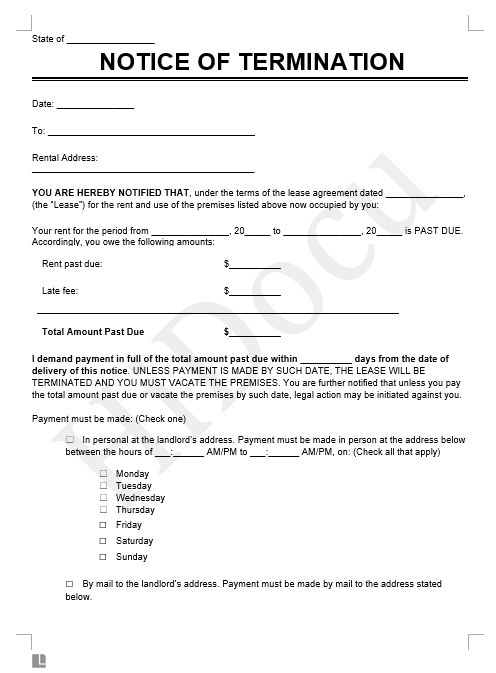Eviction Notice
An eviction notice is a letter sent by a landlord to a tenant to inform them that they must fix a certain problem or vacate the property within a certain number of days. Eviction notices are usually sent if the tenant has failed to pay rent, but are also used if the tenant has violated the terms of the lease agreement.
In some cases, the landlord may believe the problem is not fixable and send what’s known as an incurable eviction notice. In this case, the tenant has no choice but to vacate the property within a certain number of days.
€69,50
1. What is an Eviction Notice?
An eviction notice is a formal letter from the Landlord to the Tenant and officially explains:
1. The Tenant must fix or “cure” the problem;
OR
2. The Tenant must MOVE OUT by a certain date;
AND
3. The Tenant and Landlord may need to go to court to continue the eviction process.
The notice serves as a written record that the Landlord properly notified the Tenant of a problem and gave them a chance to solve the problem.
The notice BEGINS the eviction process, which varies widely state by state.
What are other names for an eviction notice?
As a reference, there are three kinds of notices:
1. Pay Rent or Quit Notices (“Failure to Pay Rent”)
The Tenant has 3 to 5 days (but check your local housing laws) to pay rent or leave.
Most state eviction laws agree that Tenants should pay their rent on time. More than a third of the states require Landlords to give a minimum 3-day eviction notice when rent is late or overdue, while almost a quarter of the states require a minimum of 5-days, and only six states require 7-days.
Three states require a 10-day notice for late rent (Indiana, North Carolina, Pennsylvania), while another three states require a minimum of 14-days (Massachusetts, Tennessee, Vermont).
The District of Columbia (D.C.) provides the most generous amount of time to Tenants and requires a minimum of 30-days notice.
Of note, six states empower Landlords and Tenants to decide on the notice requirements and refer Landlords back to the original lease or rental agreement.
2. Cure or Quit Notices (“Lease Violation”)
The Tenant has a certain amount of time to correct or “cure” a problem like violating a no smoking or no pet policy. Otherwise, they must leave or “quit” the Premises.
States vary widely on the minimum number of days a Landlord should give Tenants to cure the default (i.e., no longer violate a provision of the lease).
If a Tenant has broken one of their promises in the lease agreement, nine states require that Landlords give Tenants a minimum 3-day eviction notice. Interestingly, eight states do not require a minimum notice since the lease already spells out the obligations, and the Tenant is perhaps assumed to break the lease knowingly.
Some states require different notice periods depending on whether the Tenant materially breached the lease agreement. For example, a Tenant engaging in illegal activity like selling drugs would definitely be considered a “material” breach.
For instance, if you live in Maine, Landlords may give a 7-day notice if the Tenant materially breaches the lease or rental agreement. Otherwise, Landlords in Maine must give a 30-day notice for lease violations.
In Pennsylvania, if the tenant has rented the premises for more than one year and violates the lease agreement, landlords must provide a 30-day eviction notice. Otherwise, the tenant has rented the premises for less than one year; the landlord is only required to provide a 15-day notice.
Montana may win the award for the most unique notice requirements. In Montana, landlords must give a 14-day notice to cure or quit, but a shorter 3-day notice is allowed if the tenant violated a pet or guest policy.
3. Unconditional Quit Notices (End “Month-to-Month”)
The Tenant cannot pay rent or correct the problem because, on multiple occasions, they have:
- failed to pay rent on time
- violated the lease agreement
- seriously damaged (or is currently damaging) the Premises
- committed a crime on the premises (like selling drugs or running a prostitution business)
notice requirements for ending a mont-to-month leaseState Distribution: # of Days Notice Required to End a Month-to-Month
Most states (more than ⅔) require only a 30-day eviction notice to end a month-to-month or holdover tenancy, but some states like Delaware and Georgia provide a more Tenant friendly 60-day notice.
Some states like Colorado and Connecticut are more landlord-friendly and require only a 3-day notice, while landlords in Wyoming are not required to give any advanced notice.
Other states have unique requirements. For example, a Landlord in New Jersey must have a reason or “cause” to evict a month-to-month Tenant.
Unconditional quit notices are also used to end an unwanted landlord-tenant relationship with someone who has overstayed their lease (i.e., a Tenant at Sufferance).
Most states allow Landlords to begin eviction proceedings in court immediately. More than ⅔ of housing laws in the U.S. do not have a minimum notice requirement for eviction notices when Tenants continue to stay even after their lease has expired.
Landlords in Pennsylvania, however, must provide a 30-day notice to evict a holdover Tenant if the premises were rented for more than one year. Otherwise, only a 15-day notice is required.
Of note, if you live in California or Kentucky, be sure to check your local housing and landlord-tenant eviction laws for the latest requirements since minimum notice requirements for an eviction notice vary widely in each municipality.
Specification: Eviction Notice
|
Vendor Information
- Store Name: EMC Consultancy
- Vendor: EMC Consultancy
-
Address:
Groenstraat 27
4841BA Breda - No ratings found yet!






















